These companies stand out from the competition and can be good choices for long-term investing.
When you buy a stock, you own a piece of the underlying business. It’s important to understand the quality of the business you own, for the same reason you would test drive a new car before buying it.
The best companies tend to exceed your expectations. They find investment opportunities that you might not have thought about, or that you wouldn’t be able to pursue as an individual, increasing the intrinsic value of their business. Over time, these companies tend to be worth much more than they are today.
Long term, our analysts think having a stake in a high-quality company will put you in a far better position than chasing market movements or the brief boom of a low-quality business. With that in mind, here are a group of rock-solid companies that are truly positioned to stand the test of time.
What Makes a “Best Company”?
One of the keys to finding the best long-term investments is buying companies that can stay one step ahead of the competition. Legendary investor Warren Buffett originally coined the term “economic moat” to refer to a company’s ability to keep competitors at bay over time. Morningstar builds on this idea to rate companies based on their “moat,” or the strength and sustainability of their competitive edge.
We’ve compiled a list of the best companies our analysts cover that are available to U.S. investors. These companies have successfully carved out wide moats between them and their industry competitors, and we’re confident that they will produce returns that outweigh their costs for the next 20 years or more. In other words, these companies will reliably be able to produce returns for investors over a long period even as they invest in their growth. The strength of their competitive advantages is also either steady or increasing, which adds to our confidence in their long-term growth.
A company’s longevity and competitive advantage are inherently tied to sustainability, so our analysis takes environmental, social, and governance, or ESG, considerations into account. The best companies have business models that allow them to effectively navigate evolving ESG issues that could materially impact their business. Cutting corners or taking on too much risk may work in the short run, but these tactics won’t give a company enduring success.
The companies that make our list also have predictable cash flows (or predictable amounts of money going into and out of a company), so our analysts can more accurately estimate how much the businesses are worth. These companies also make smart decisions about how they manage and invest their money.
We aren’t advocating that you buy shares of every company on this list today. Even the greatest company can be a bad investment if you overpay. The share prices of many companies on this list overestimate their real value, so it may not be the right time to buy. Still, we believe these companies are essential for any stock investor’s watchlist.
We’ve grouped the companies on this list according to the overall sectors of the economy in which they compete.
Consumer Defensive Companies
The consumer defensive sector isn’t what it sounds like. Think brands you find in your home—companies that manufacture household and personal products, food, and beverages. It also includes discount stores.
These companies provide services that consumers always need, so changes in the economy, like downturns, generally don’t have much impact on the sector. That’s where the “defensive” of consumer defensive comes in: The sector isn’t impacted by the ups and downs of the economy. Many of the companies below have strengthened their positions by developing a strong relationship with shoppers and offering either lower prices than their competitors or a strong brand identity that justifies higher pricing.
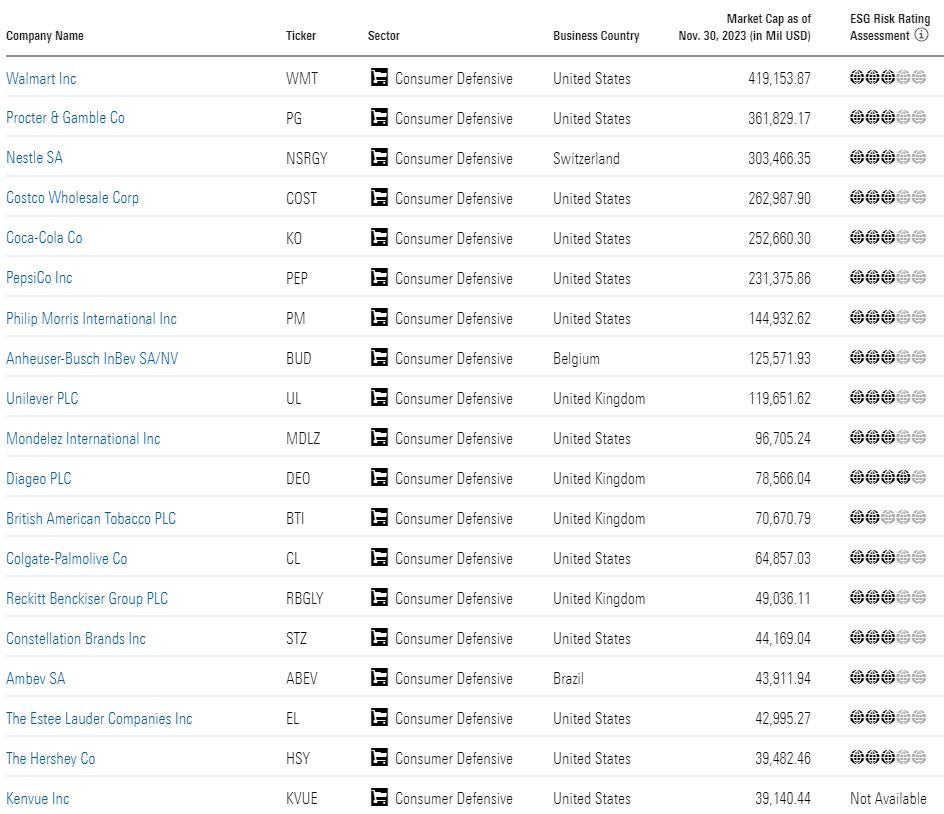

Financial Services Companies
The financial-services sector includes banks, asset managers, financial research and data companies, credit services, investment brokerage firms, stock exchanges, and insurance companies. Just as the services they supply differ, the companies below fend off competition in distinct ways. The most common characteristic among them is that their customers face relatively high hurdles when they want to switch service providers.
Many companies in this sector are economically sensitive with interest rates, the level of the stock market, and financial health of consumers and businesses affecting results.
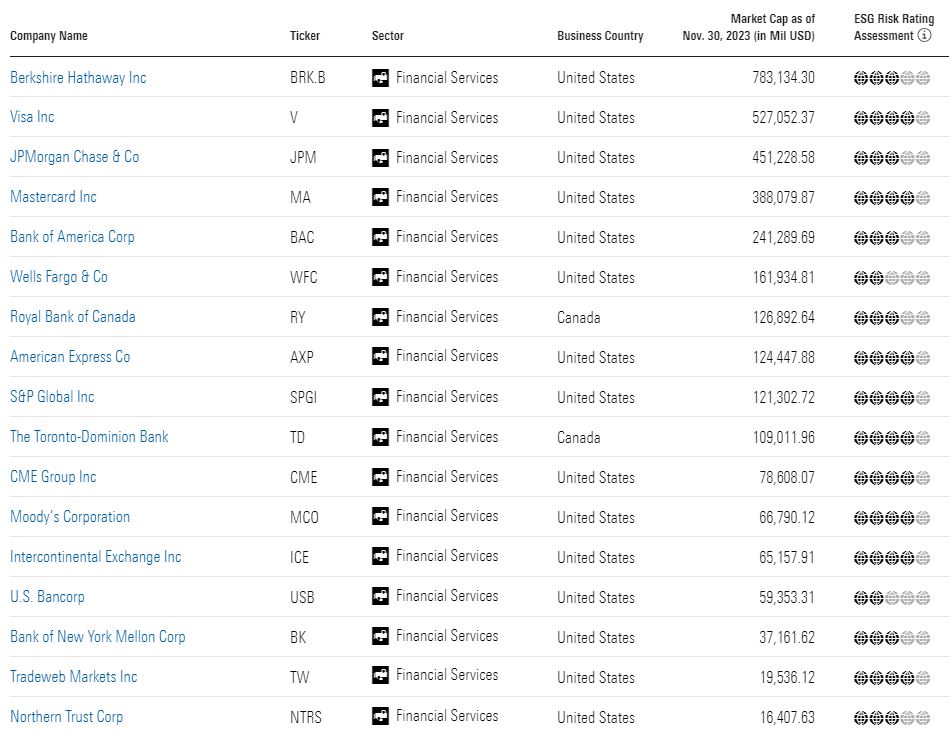
Healthcare Companies
Healthcare is another sector that generally holds steady no matter what is happening in the economy. The healthcare sector includes companies in biotechnology, diagnostics and research, drug manufacturing, and health information services.
Many of the high-quality healthcare companies that made our list are drug manufacturers whose patent protection keeps competitors at bay.
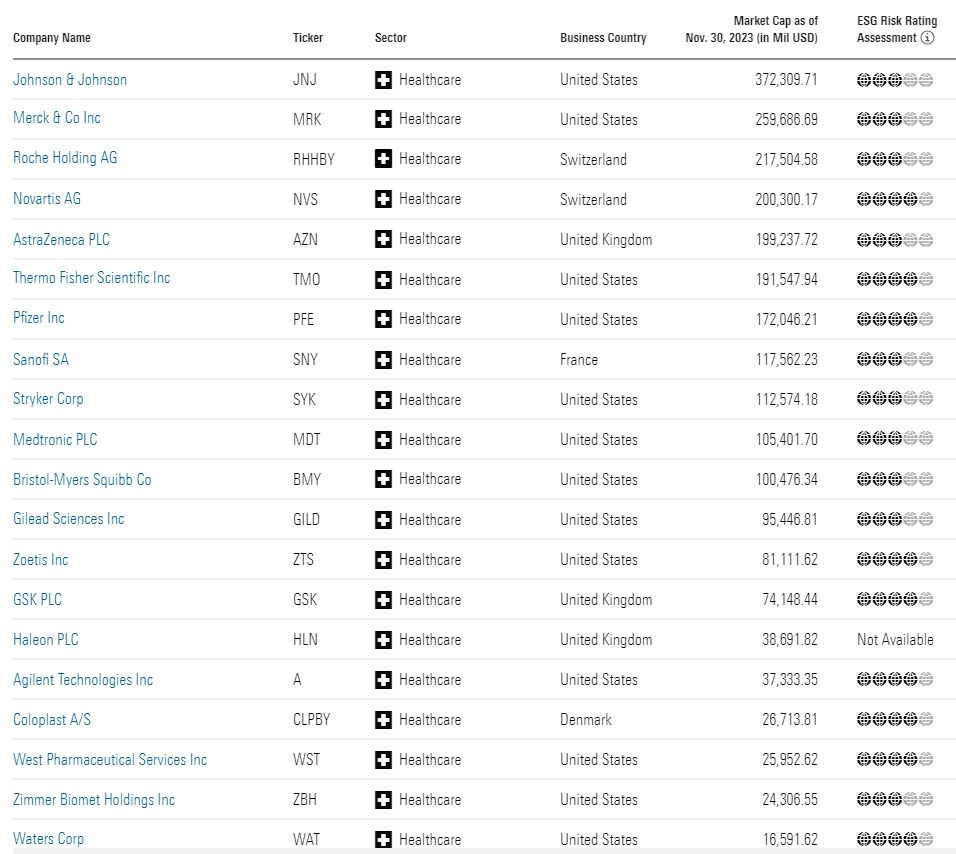
Industrial Companies
Planes, trains, and heavy machinery. Companies in the industrials sector support and transport all things industry. The sector includes companies that produce machinery, hand-held tools, and industrial products. It also includes aerospace and defense firms as well as transportation services. More companies from the industrials sector made our list than from any other group.
Many of these companies benefit from their incumbent position in their respective industries. It allows these businesses to develop brands and patents that give them their edge. Many further benefit from a cost advantage, operating in industries where infrastructure or regulation limitations make it expensive for new competitors to enter the market.
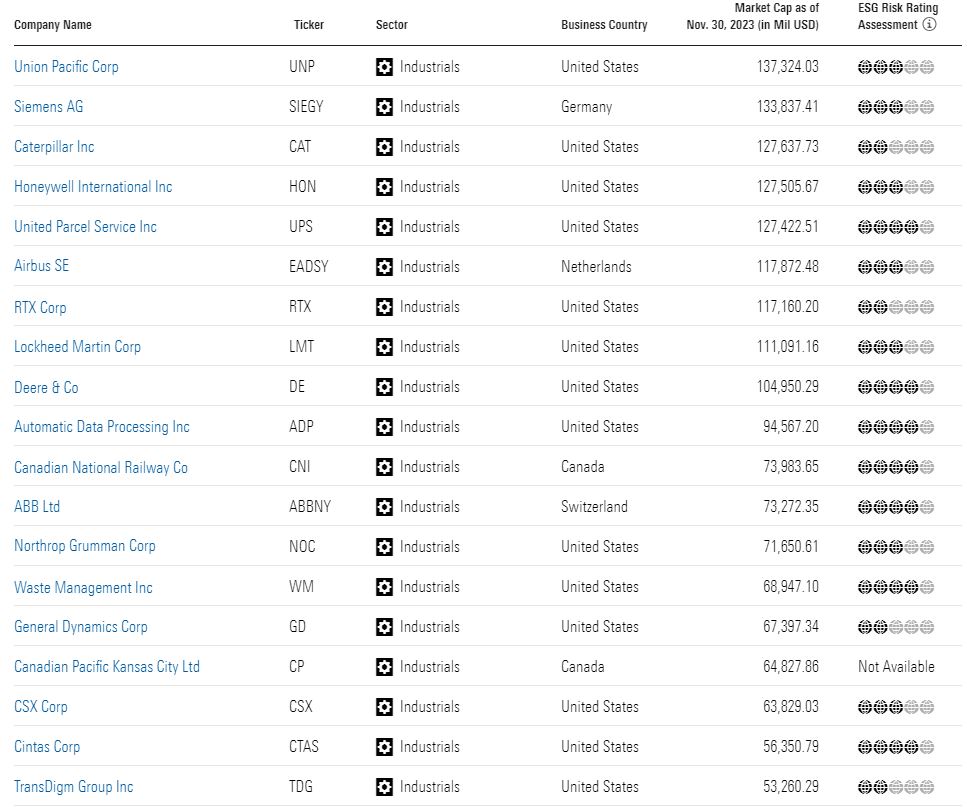
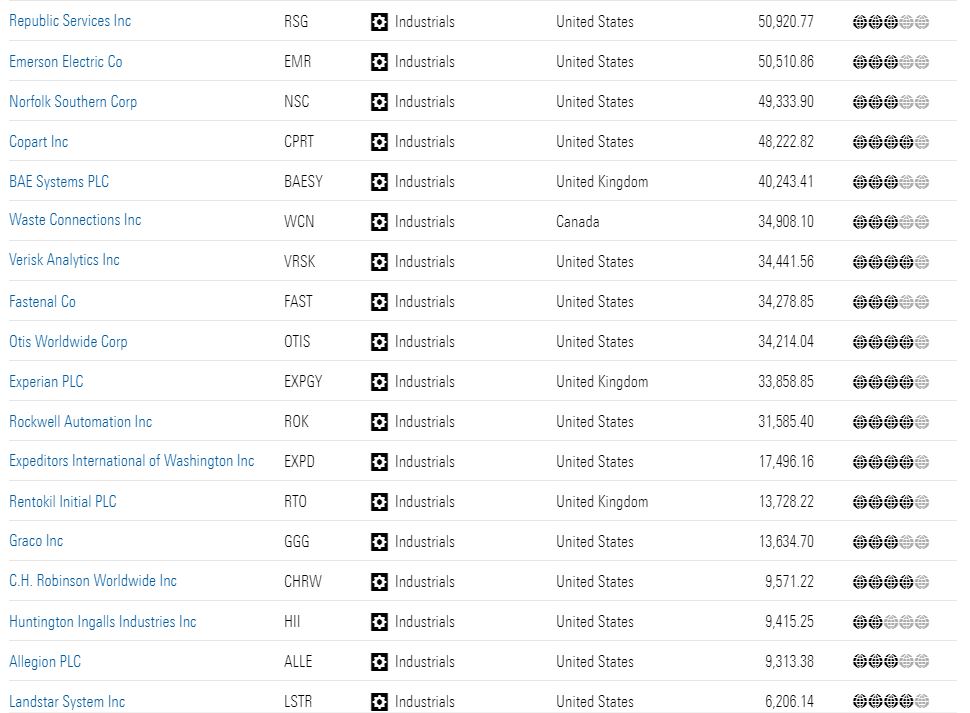
Technology Companies
Technology is an area that is infamously ripe for disruptors, but some companies have been able to carve out pockets of stability. Companies in the technology sector are engaged in the design, development, and support of computer operating systems and applications. This sector also includes companies that make computer equipment, data storage products, networking products, semiconductors, and components.
Many of the companies that made our list are software application developers that keep their position by providing services with high switching costs. Customers find it difficult to stop using their services because it’s hard to do, expensive, or risky to make the switch.
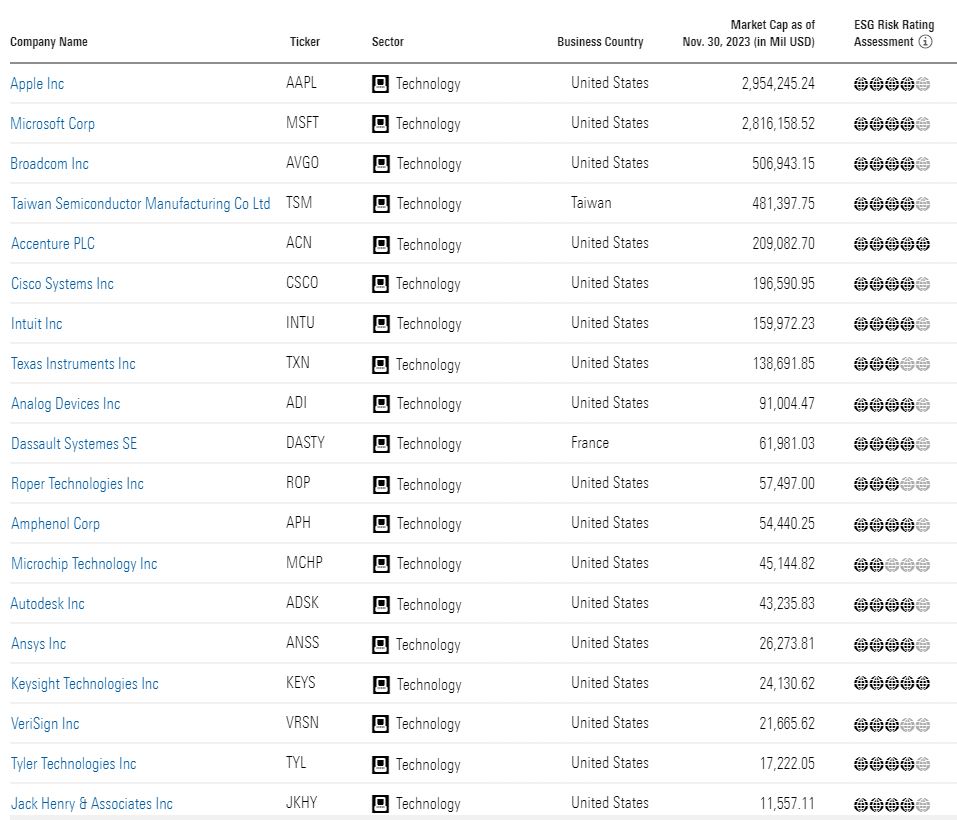
Other Sectors
The companies below represent various sectors: basic materials, communication services, consumer cyclical, energy, and utilities. Most of these sectors, except for utilities, ebb and flow with the overall economy, so predicting companies’ cash flows is more difficult.
Many of these companies also operate in highly competitive or evolving industries where it can be hard to create a sustainable competitive advantage.
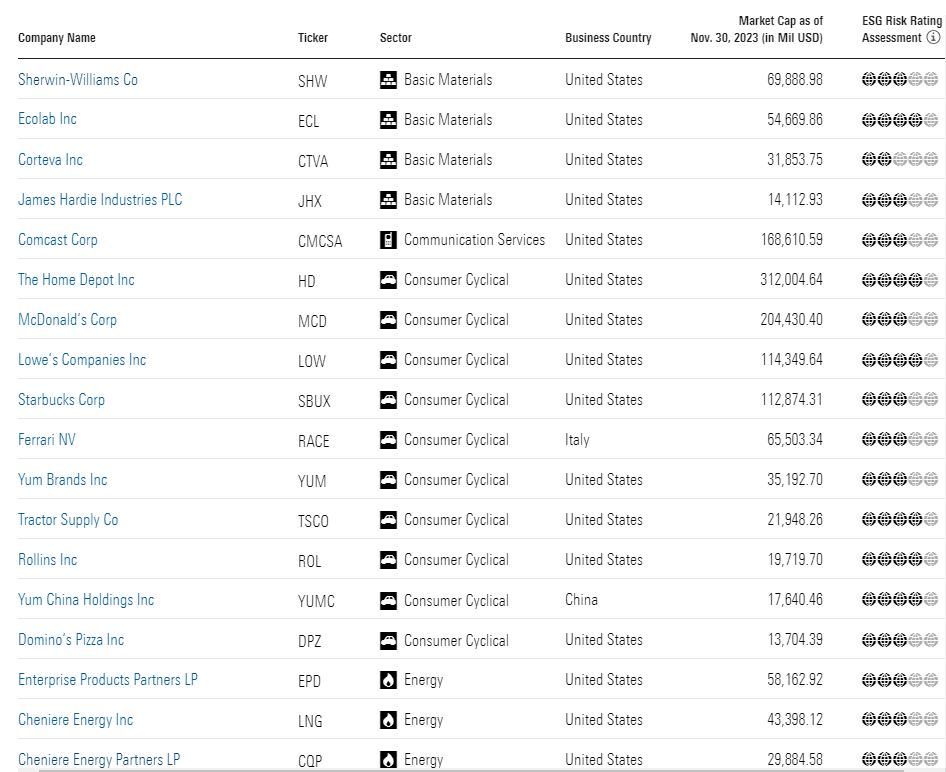
Best Companies to Own 2024: Methodology
The companies on this list are covered by Morningstar Research Services’ equity analysts and have shares available to U.S. investors. This means that Morningstar equity analysts have calculated fair value estimates for the shares of the companies that trade on U.S. exchanges. As a result, most of the companies on this list are based in the United States.
Within that coverage list, the best companies meet the following criteria:
- Wide Economic Moat. The Morningstar Economic Moat Rating summarizes the length of a company’s competitive advantages. An economic moat is really a structural feature allowing a firm to generate excess profits over a long period of time. If Morningstar Research Services believes that excess returns will persist for 20 years or more, that company earns a wide economic moat.
- Standard or Exemplary Capital Allocation. The Stock Capital Allocation Rating is an assessment of the quality of management’s capital allocation, with particular emphasis on the firm’s balance sheet, investments, and shareholder distributions. Capital allocation is judged from an equity shareholder’s perspective, considering companies’ investment strategy and valuation, balance sheet management, and dividend and share buyback policies on a forward-looking basis. A company can receive an exemplary, standard, or poor capital allocation rating.
- Low or Medium Fair Value Uncertainty. The Fair Value Uncertainty Rating represents the predictability of a company’s future cash flows and, therefore, the level of certainty in the fair value estimate of that company. The uncertainty rating for a company can be low, medium, high, very high, or extreme. It captures a range of likely potential intrinsic values for a company based on the characteristics of the business underlying the stock, including such things as operating and financial leverage, sales sensitivity to the economy, product concentration, and other factors. The more predictable cash flows, the smaller the range of potential intrinsic values, the lower the uncertainty.
Morningstar Disclaimers:
The opinions, information, data, and analyses presented herein do not constitute investment advice; are provided as of the date written; and are subject to change without notice. Every effort has been made to ensure the accuracy of the information provided, but Morningstar makes no warranty, express or implied regarding such information. The information presented herein will be deemed to be superseded by any subsequent versions of this document. Except as otherwise required by law, Morningstar, Inc or its subsidiaries shall not be responsible for any trading decisions, damages or losses resulting from, or related to, the information, data, analyses or opinions or their use. Past performance is not a guide to future returns. The value of investments may go down as well as up and an investor may not get back the amount invested. Reference to any specific security is not a recommendation to buy or sell that security. It is important to note that investments in securities involve risk, including as a result of market and general economic conditions, and will not always be profitable. Indexes are unmanaged and not available for direct investment.
This commentary may contain certain forward-looking statements. We use words such as “expects”, “anticipates”, “believes”, “estimates”, “forecasts”, and similar expressions to identify forward-looking statements. Such forward-looking statements involve known and unknown risks, uncertainties and other factors which may cause the actual results to differ materially and/or substantially from any future results, performance or achievements expressed or implied by those projected in the forward-looking statements for any reason.
The Report and its contents are not directed to, or intended for distribution to or use by, any person or entity who is a citizen or resident of or located in any locality, state, country or other jurisdiction where such distribution, publication, availability or use would be contrary to law or regulation or which would subject Morningstar or its subsidiaries or affiliates to any registration or licensing requirements in such jurisdiction.
MeDirect Disclaimers:
This information has been accurately reproduced, as received from Morningstar, Inc. No information has been omitted which would render the reproduced information inaccurate or misleading. This information is being distributed by MeDirect Bank (Malta) plc to its customers. The information contained in this document is for general information purposes only and is not intended to provide legal or other professional advice nor does it commit MeDirect Bank (Malta) plc to any obligation whatsoever. The information available in this document is not intended to be a suggestion, recommendation or solicitation to buy, hold or sell, any securities and is not guaranteed as to accuracy or completeness.
The financial instruments discussed in the document may not be suitable for all investors and investors must make their own informed decisions and seek their own advice regarding the appropriateness of investing in financial instruments or implementing strategies discussed herein.
If you invest in this product you may lose some or all of the money you invest. The value of your investment may go down as well as up. A commission or sales fee may be charged at the time of the initial purchase for an investment. Any income you get from this investment may go down as well as up. This product may be affected by changes in currency exchange rate movements thereby affecting your investment return therefrom. Any decision to invest should always be based upon the details contained in the Prospectus and Key Information Document (KID), which may be obtained from MeDirect Bank (Malta) plc.





